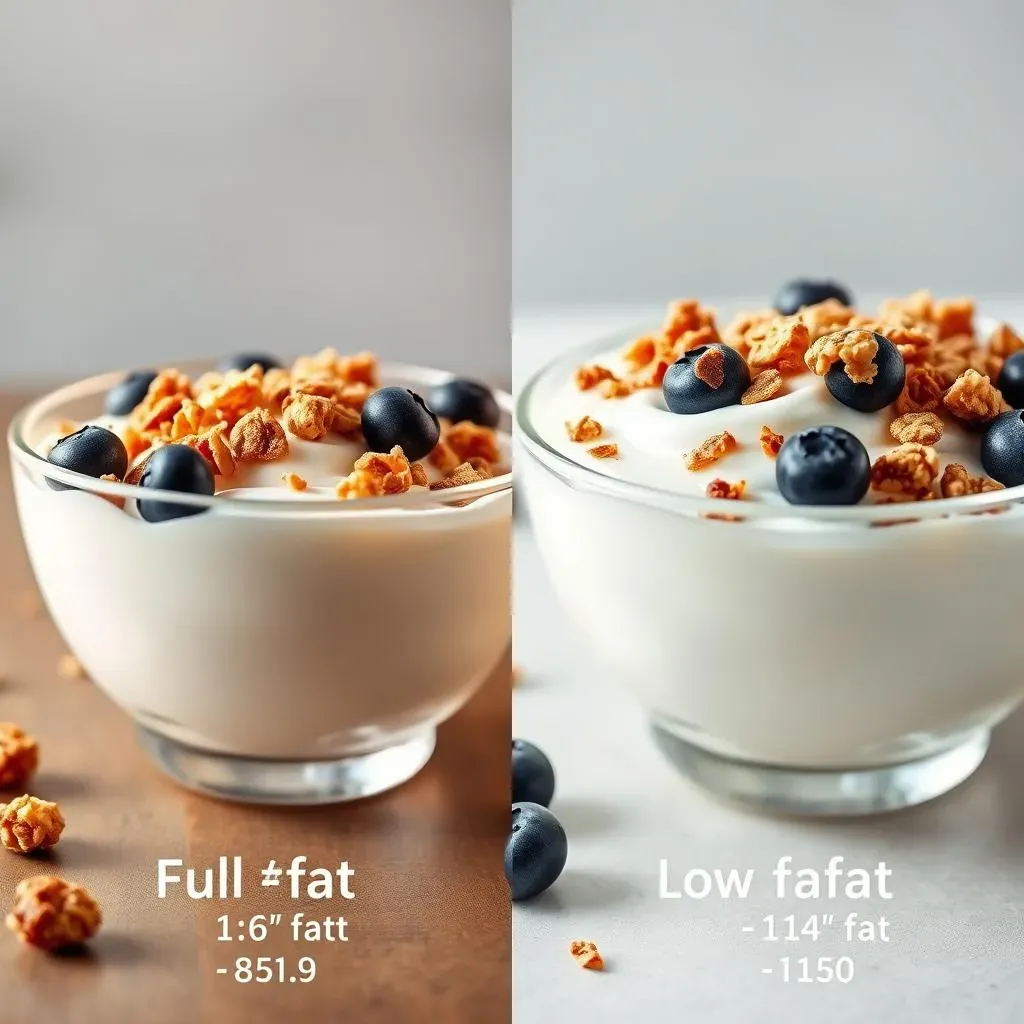Table of Contents
In the swirling world of health foods, yogurt often takes center stage, lauded for its creamy texture and probiotic punch. But when you hit the dairy aisle, a crucial question pops up: is low fat yogurt better for you? It's a question that's more complex than it seems at first glance. We're constantly bombarded with messages about cutting fat, but does that automatically make low fat yogurt the superior choice? This article dives deep into the nutritional landscape of both low fat and full fat yogurt, separating fact from fiction. We'll explore the potential health benefits each offers, from boosting your gut health to providing essential nutrients. We'll also peel back the label to uncover sneaky additives that might be lurking in your low fat option. By the end, you'll have the knowledge to confidently choose the yogurt that truly aligns with your dietary needs and taste preferences. So, grab a spoon and let's get started!
Low Fat vs. Full Fat Yogurt: A Nutritional Showdown

Low Fat vs. Full Fat Yogurt: A Nutritional Showdown
The Calorie and Macro Breakdown
so let's get down to brass tacks. When you're staring at those yogurt containers, the first thing you probably notice is the calorie count. Generally, full fat yogurt is going to clock in with more calories than its low fat counterpart. That's because fat is more calorie-dense than protein or carbs. But don't let that scare you off just yet! We need to look at the bigger picture, which means diving into the macronutrients: fat, protein, and carbohydrates. Full fat yogurt naturally has more fat, which contributes to its higher calorie count. Low fat yogurt, on the other hand, reduces the fat content, leading to fewer calories. However, the protein content is often similar between the two, hovering around a respectable 18 grams per 6-ounce serving. The carb content can vary more widely, especially depending on whether the yogurt is plain or flavored. This is where things start to get interesting, and where label reading becomes your superpower.
Think of it like this: a full fat yogurt might be like a slow-burning log in a fireplace, providing sustained energy, while a low fat yogurt could be like kindling, burning quickly but potentially leaving you wanting more soon after. The key is understanding how these different fuel sources work in your body and how they align with your overall dietary goals. Are you trying to cut calories? Then low fat might seem like the obvious choice. But are you looking for something that will keep you feeling full and satisfied for longer? Then full fat might actually be the better option. It all depends on your individual needs and how you balance your diet throughout the day.
The Satiety Factor: Does Fat Keep You Fuller?
This is where the rubber meets the road, in my opinion. One of the biggest arguments in favor of full fat yogurt is its impact on satiety – that feeling of fullness and satisfaction after eating. Fat takes longer to digest than carbs or protein, which means it can help slow down the emptying of your stomach and keep you feeling satisfied for longer. This can be a game-changer if you're trying to manage your weight or simply avoid those mid-afternoon energy crashes that send you reaching for a sugary snack. Studies have shown that including healthy fats in your diet can actually help regulate your appetite and reduce overall calorie intake. So, while full fat yogurt might have more calories per serving, it could actually help you eat less throughout the day by keeping you feeling fuller for longer.
However, it's not a magic bullet. The satiety factor is highly individual and depends on a variety of factors, including your overall diet, activity level, and even your genetics. Some people find that full fat yogurt keeps them feeling full and energized for hours, while others don't notice a significant difference. It's all about experimenting and finding what works best for your body. And remember, not all fats are created equal. The saturated fat in full fat yogurt is a different beast than the trans fats found in processed foods. We'll dive deeper into the saturated fat debate later, but for now, just keep in mind that the type of fat matters as much as the amount.
Nutrient | Full Fat Yogurt (per 6oz serving) | Low Fat Yogurt (per 6oz serving) |
|---|---|---|
Calories | Around 150-180 | Around 100-120 |
Fat | 8-10g | 0-2g |
Protein | 15-20g | 15-20g |
Carbohydrates | 5-8g | 5-10g (can be higher with added sugar) |
Health Benefits of Yogurt: Beyond the Fat Content

Health Benefits of Yogurt: Beyond the Fat Content
Probiotics: Your Gut's Best Friend
so we've talked about fat, calories, and macros, but yogurt's real superpower lies in its probiotic content. Probiotics are live microorganisms – the "good" bacteria – that reside in your gut and play a crucial role in your overall health. They help maintain a healthy balance of bacteria in your digestive system, which can improve digestion, boost your immune system, and even impact your mental health. Yogurt, especially Greek yogurt, is a fantastic source of these beneficial bacteria. When you eat yogurt, you're essentially sending reinforcements to your gut army, helping them fight off the bad guys and keep everything running smoothly.
Not all yogurts are created equal when it comes to probiotics. Look for yogurts that have "live and active cultures" listed on the label. This means that the yogurt contains a significant amount of beneficial bacteria. Different strains of probiotics offer different benefits, so it's worth experimenting to see which ones work best for you. Some common strains found in yogurt include Lactobacillus and Bifidobacterium. These strains have been linked to improvements in digestion, reduced bloating, and even a lower risk of certain infections. So, whether you choose low fat or full fat, make sure your yogurt is packed with those gut-friendly probiotics!
Essential Nutrients: Calcium, Potassium, and More
Beyond probiotics, yogurt is a nutritional powerhouse, brimming with essential vitamins and minerals. Calcium is a big one, crucial for strong bones and teeth. A single serving of yogurt can provide a significant chunk of your daily calcium needs. Potassium is another important mineral found in yogurt, which helps regulate blood pressure and muscle function. Yogurt also contains vitamin B12, which is essential for nerve function and red blood cell production. These nutrients are vital for maintaining overall health and well-being, and yogurt is a delicious and convenient way to get them into your diet.
Now, you might be wondering if the nutrient content differs between low fat and full fat yogurt. Generally, the levels of calcium, potassium, and vitamin B12 are similar between the two. However, full fat yogurt does contain fat-soluble vitamins like vitamin A and vitamin D, which are more readily absorbed when consumed with fat. So, if you're looking to maximize your vitamin A and D intake, full fat yogurt might have a slight edge. But overall, both low fat and full fat yogurt are excellent sources of essential nutrients.
"Yogurt isn't just a snack; it's a powerhouse of probiotics and essential nutrients that contribute to a healthier you."
The Protein Punch: Fueling Your Muscles and Keeping You Full
Let's not forget about protein! Yogurt, especially Greek yogurt, is an excellent source of protein, which is essential for building and repairing tissues, supporting muscle growth, and keeping you feeling full and satisfied. A 6-ounce serving of Greek yogurt can pack around 15-20 grams of protein, making it a fantastic addition to any diet. Protein is also important for weight management, as it helps regulate appetite and boost metabolism. When you consume enough protein, you're less likely to experience cravings and overeat. So, whether you're hitting the gym or just trying to stay on track with your healthy eating goals, yogurt is a great way to get your protein fix.
The protein content is generally similar between low fat and full fat yogurt, so you don't have to sacrifice protein to save on calories. However, it's important to check the label, as some brands add extra protein to their low fat options to compensate for the reduced fat content. This can be a good thing if you're specifically looking to boost your protein intake, but it's always best to be aware of what you're putting into your body. So, load up on that protein-packed yogurt and feel the benefits!
Navigating Additives: Are They Hiding in Your Low Fat Yogurt?

Navigating Additives: Are They Hiding in Your Low Fat Yogurt?
The Sugar Trap: Replacing Fat with Sweetness
Alright, this is where things can get a little sneaky. When food manufacturers remove fat from a product, like yogurt, they often need to compensate for the loss of flavor and texture. And what's their go-to ingredient for that? You guessed it: sugar. So, while you might be saving on fat calories by choosing low fat yogurt, you could be unknowingly loading up on added sugars. This is especially true for flavored yogurts, which can be packed with sweeteners like sucrose, high fructose corn syrup, or even "natural" sweeteners like honey or agave. All of these added sugars can contribute to weight gain, blood sugar imbalances, and other health problems. So, the key is to become a label detective and scrutinize those ingredient lists!
I always tell people, don't be fooled by marketing claims like "light" or "healthy." Turn that container around and take a good, hard look at the nutrition facts panel. Pay close attention to the "added sugars" line, and try to choose yogurts with the lowest amount possible. Better yet, opt for plain, unsweetened yogurt and add your own natural sweeteners like fresh fruit, a drizzle of maple syrup, or a sprinkle of cinnamon. This way, you have complete control over the sweetness level and can avoid those unnecessary added sugars.
Artificial Sweeteners and Thickeners: What Are You Really Eating?
But sugar isn't the only culprit lurking in low fat yogurt. To further enhance the flavor and texture, some manufacturers turn to artificial sweeteners and thickeners. Artificial sweeteners like aspartame, sucralose, and saccharin are used to add sweetness without the calories of sugar. However, there's a lot of debate about the potential health effects of these artificial sweeteners. Some studies have linked them to changes in gut bacteria, increased cravings, and even a higher risk of certain diseases. While the research is still ongoing, it's worth being aware of these potential risks and making informed choices about what you're putting into your body.
Thickeners like modified food starch, guar gum, and carrageenan are often added to low fat yogurt to improve its texture and prevent it from becoming too watery. While these thickeners are generally considered safe, some people may experience digestive issues like bloating or gas after consuming them. Carrageenan, in particular, has been a subject of controversy, with some studies suggesting it may cause inflammation in the gut. Again, the best approach is to read labels carefully and choose yogurts with minimal ingredients. The simpler the ingredient list, the better!
"Read labels like your health depends on it, because it does! Don't let sneaky additives sabotage your healthy eating goals."
Making the Right Choice: Is Low Fat Yogurt Better for Your Diet?

Making the Right Choice: Is Low Fat Yogurt Better for Your Diet?
Know Yourself: Aligning Yogurt with Your Goals
so we've laid out all the facts, but now comes the most important part: figuring out what all this means for *you*. Is low fat yogurt better for *your* diet? The truth is, there's no one-size-fits-all answer. The best type of yogurt depends entirely on your individual health goals, dietary needs, and taste preferences. Are you trying to lose weight? Manage your blood sugar? Boost your protein intake? All of these factors will influence your decision. If you're primarily focused on cutting calories and fat, then low fat yogurt might seem like the obvious choice. However, if you're looking for something that will keep you feeling full and satisfied, or if you're following a higher-fat diet like keto, then full fat yogurt could be a better fit.
It's also important to consider your overall eating habits. Are you already getting plenty of healthy fats from other sources? Then maybe low fat yogurt is a good way to balance things out. Or are you struggling to get enough protein? Then a high-protein yogurt, regardless of its fat content, might be a smart choice. The key is to take a holistic approach and consider how yogurt fits into your entire dietary picture. And don't be afraid to experiment! Try different types of yogurt and see how they make you feel. Pay attention to your energy levels, your hunger cues, and your overall well-being. This is all about finding what works best for *your* body and *your* lifestyle.
Listen to Your Body: Taste, Texture, and Satisfaction
Ultimately, the best yogurt is the one you actually enjoy eating! If you find the taste or texture of low fat yogurt unappealing, you're less likely to stick with it in the long run. And let's be honest, life's too short to eat food you don't enjoy. Full fat yogurt often has a richer, creamier texture that some people find more satisfying. This can make it easier to incorporate into your diet and help you feel more content after eating. However, if you prefer the lighter taste of low fat yogurt, that's perfectly fine too! The most important thing is to choose a yogurt that you genuinely like and that you'll look forward to eating.
Don't underestimate the power of taste and texture when it comes to making healthy choices. If you're forcing yourself to eat something you don't enjoy, you're more likely to crave unhealthy foods and derail your progress. So, listen to your body, trust your taste buds, and choose a yogurt that makes you happy. And remember, you can always dress up your yogurt with healthy toppings like fresh fruit, nuts, seeds, or a sprinkle of cinnamon. This can add extra flavor, texture, and nutrients, making your yogurt even more enjoyable and satisfying.
"The 'best' yogurt is the one that aligns with your taste, health goals, and makes you genuinely happy to eat!"
The Verdict: Choosing the Right Yogurt for You
So, is low fat yogurt better for you? The answer, as you've probably gathered, isn't a simple yes or no. It depends entirely on your individual needs, dietary goals, and preferences. Both low fat and full fat yogurts offer unique benefits. If you're strictly watching your calorie intake or aiming to minimize saturated fat, low fat might be the way to go. However, if you prioritize satiety, enjoy the richer taste, and aren't concerned about the slightly higher calorie count, full fat could be a satisfying and nutritious choice. Ultimately, the best yogurt is the one that you enjoy eating and that fits seamlessly into your overall healthy lifestyle. Don't be afraid to experiment, read labels carefully, and listen to your body. Happy yogurt-ing!
